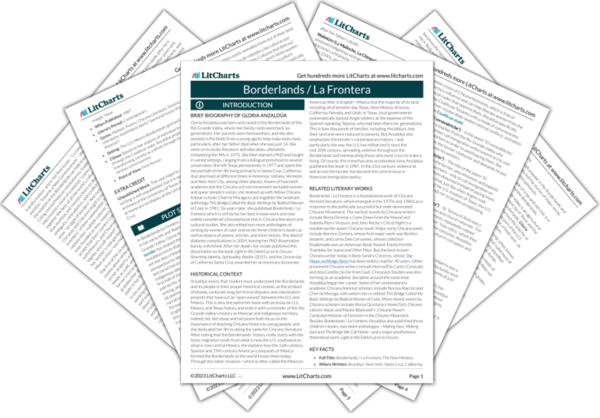Mestiza/o/aje Quotes in Borderlands / La Frontera
So, don’t give me your tenets and your laws. Don’t give me your lukewarm gods. What I want is an accounting with all three cultures—white, Mexican, Indian. I want the freedom to carve and chisel my own face, to staunch the bleeding with ashes, to fashion my own gods out of my entrails. And if going home is denied me then I will have to stand and claim my space, making a new culture—una cultura mestiza —with my own lumber, my own bricks and mortar and my own feminist architecture.
For 300 years [the dark-skinned woman] was invisible, she was not heard. Many times she wished to speak, to act, to protest, to challenge. The odds were heavily against her. She hid her feelings; she hid her truths; she concealed her fire; but she kept stoking the inner flame. She remained faceless and voiceless, but a light shone through her veil of silence. And though she was unable to spread her limbs and though for her right now the sun has sunk under the earth and there is no moon, she continues to tend the flame. The spirit of the fire spurs her to fight for her own skin and a piece of ground to stand on, a ground from which to view the world—a perspective, a homeground where she can plumb the rich ancestral roots into her own ample mestiza heart.
Because the future depends on the breaking down of paradigms, it depends on the straddling of two or more cultures. By creating a new mythos—that is, a change in the way we perceive reality, the way we see ourselves, and the ways we behave—la mestiza creates a new consciousness.
The work of mestiza consciousness is to break down the subject-object duality that keeps her a prisoner and to show in the flesh and through the images in her work how duality is transcended. The answer to the problem between the white race and the colored, between males and females, lies in healing the split that originates in the very foundation of our lives, our culture, our languages, our thoughts. A massive uprooting of dualistic thinking […] is the beginning of a long struggle […] that could […] bring us to the end of rape, of violence, of war.












